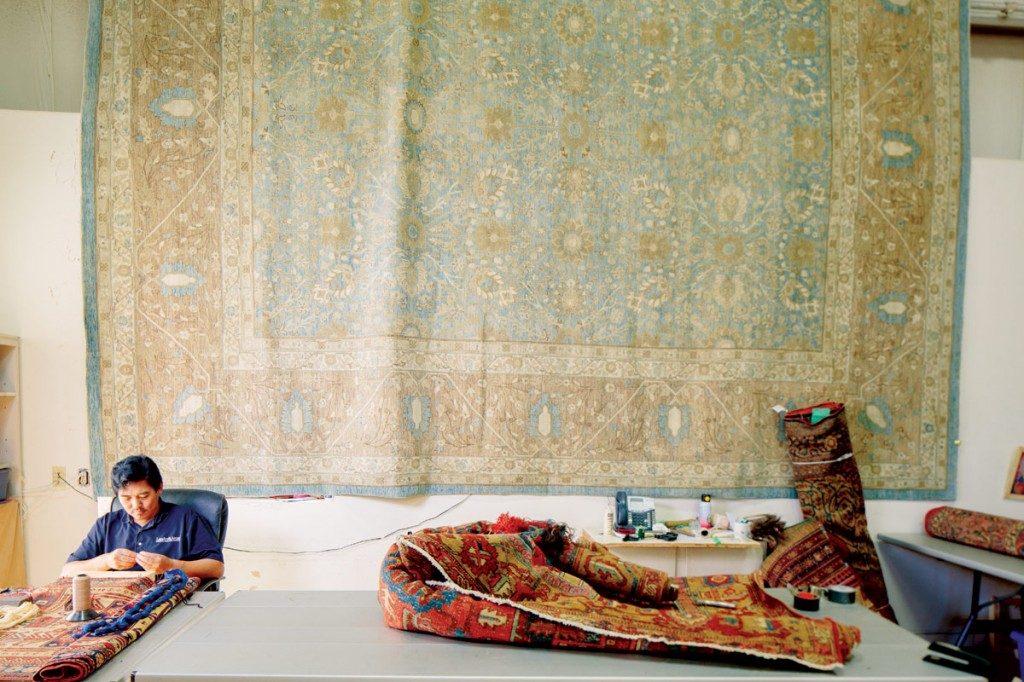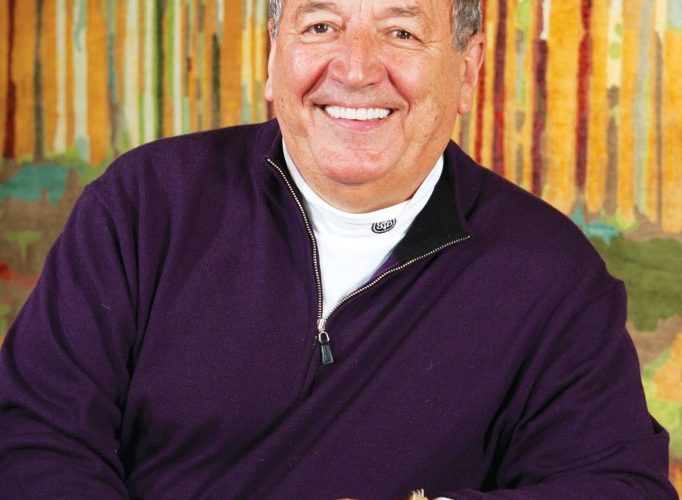When it comes to family and community, Landry & Arcari embraces its relationships with the strength of a well-tied knot. By Kiley Jacques – photographs by Jared Charney
It all began with Jerry Arcari’s after-school job in a Lawrence rug shop. His effort to earn a little pocket money quickly turned into a lifelong passion for the industry. Young Arcari was fascinated by the stories the rugs told of people and faraway places. The rugs he washed became a symbol of travel and commerce. It was this idea that has the North Andover native now saying, “Landry & Arcari: We bring the world to your feet.”
Following the flame ignited by his early job, Arcari pursued an apprenticeship with an Oriental rug expert from Beirut and spent 12 years working as a buyer for Jordan Marsh in Peabody. Then, in 1981, equipped with an impressive level of expertise, he and his wife, Connie, purchased Salem-based Landry Brothers Upholstery Furniture, whereupon the family-owned and -operated Landry & Arcari Oriental Rugs and Carpeting was born.
In time, the Arcari children—Jay, Julie, and Jeffrey—entered the business and now share ownership. Though establishing themselves in their current roles 15 to 20 years ago, all were required to work in the store as adolescents. On weekends, says the senior Arcari, “they were sweeping, flipping rugs, or doing whatever was necessary to make the business run properly.” Today, with a business management degree from Northeastern University, Julie Arcari, CEO, controls the finances; Jay, as operations manager, runs the Salem store and supervises rug installations; Jeffrey is the Orientals specialist, who does all overseas buying, controls production looms, manages the antique collections, and runs the restoration department; and father Jerry serves as senior adviser. Suffice it to say, the Arcaris are a very busy lot.
A third generation of the family is now lending a hand, too, with grandson Ben Cook—a student at Emerson College—taking an active role in the Boston store. “It’s the frosting on the cake for me to have my grandson and children in the business,” says Arcari. “I’m very, very fortunate and grateful for that.” He attributes their sustained interest and success in the business to the family’s ability to maintain balance, explaining that each of them has a distinct function and everyone plays an equally vital role. But, he notes, family comes first. “We’ve always said we would never let the business come between [us].” A fierce passion for the industry and a sustained commitment to familial ties, in concert with a long-ago ingrained work ethic, are at the root of Landry & Arcari’s good name.
An extension of this unyielding family bond comes in the form of community involvement—both locally and internationally. As supporters of Barakat, Inc.—a non-profit organization at work in Afghanistan, Pakistan, and India to advance educational opportunities, especially for women and children—Landry & Arcari demonstrates a unique compassion for industry associates. Additionally, the company has helped build a school in India and contribute funds for a hospital currently under construction. Furthermore, proceeds from rug sales go back to the communities that made them. As former president of the Oriental Rug Dealers’ Association of Massachusetts and a member of the Oriental Rugs Retailers Association, the senior Arcari works in many capacities, ensuring that ethical guidelines for rug production are instituted and adhered to worldwide. It is this devotion to principles that gives Landry & Arcari its deserved credibility as a company with a conscience.
International working relationships began when a 19-year-old Jeffrey’s eagerness to travel led him to Afghanistan and India. He connected with people and saw a need for education and economic stimulation. Given his background, it made sense to start a production loom, and he did just that in tandem with another dealer. To this day, the Arcari family maintains close overseas ties, exchanging visits with weavers in Nepal, Pakistan, and India, where the Arcaris own looms. “[It’s] almost an extension of our family,” says Jerry Arcari. “Those relationships are cherished.” Jeffrey is now known worldwide for his ability to buy and buy correctly. He knows rugs and works well with older merchants and newer ones; he is the glue that keeps international relations strong.
Efforts to support non-profit endeavors for the betterment of society also include collaboration with Goodweave—an international organization working to prevent child labor by building schools and developing educational programs.Locally, Landry & Arcari cultivates a long-standing relationship with WBUR as its oldest advertiser; they also host fundraisers on behalf of the Peabody Essex Museum and have done so since its days as the Essex Institute. Furthering its education advocacy mission, Landry & Arcari holds free public lectures regularly. Presentations include information about antique and new rugs, weaving and rug repair, and the ever-popular topic of interior design.

Landry & Arcari still employs painstaking methods by hand.
At this stage in the game, Arcari works primarily in the company’s Boston store. He speaks fondly of his years spent surrounded by rugs and customers. “My favorite thing to do is work the floor. I love that,” he says. “It gives me an opportunity to work with clients that I’ve had for many years, and it keeps me in touch with all the products that are out there and available.” He describes how the advancement of technology has meant significant changes in the rug and carpet industry. “I started in the business in the Dark Ages,” Arcari says, joking that he adds the initials B.D. (before digital) after his name. Today, custom-designed, computer-generated images travel overseas with such speed that the idea for a rug can take shape on a loom within 24 hours; 20 years ago the process would have taken up to six weeks. Arcari notes that though the industry has changed, the process of making rugs remains the same; the knots are still tied by hand using traditional techniques that haven’t been touched by technology.
Custom-designed rugs now make up a large part of the business, sharing popularity with Belgium Wiltons, English Axminsters, and fine New Zealand carpets—to name but a few Landry & Arcari notables. Contemporary designs made of wools and silks are also en vogue—a trend that began about 10 years ago, when large antique Orientals fell out of favor as older suburbanites sold their spacious homes and moved into smaller city quarters. With the trading of historic homes for chic condos and brickstones came the desire for modern floor decor, alhough, as Arcari points out, Beacon Hill homes still “cry for antiques.” Another type of design, referred to as “Transitional,” is something between the old and the new; Arcari describes it as more moderate in its appeal. With each decade comes a traceable shift in trends—one Arcari compares to the age rings seen inside a cut tree.
Listening to Arcari talk about the industry makes one realize that buying a rug from Landry & Arcari is not just a matter of making a purchase; it’s also an educational opportunity in and of itself. “When we sell a rug, we let clients know where it was made and who made it,” he says. It’s this background information that excites him most. He explains how a $7,000 rug is inexpensive considering what goes into making it. “I’ve counted 22 different industries that are support[ing] the rug industry to get that rug on your floor.” He is referring, in part, to rearing and shearing sheep; spinning, dyeing, and drying wool; designing a rug; getting wool to the loom; weaving a rug; and shipping it to its final destination. To demonstrate the complexities of the process, he offers a 45-minute CD showing its entirety—from farm to floor.
The farmers, dyers, and weavers remain the constants in rug making, and they are what make the results so special. “The real thing,” says Arcari, “is the human spirit that goes into making a rug…it’s the person who’s woven that carpet and put it together.” Without that spirit, a rug is just a floor covering. “Some carpets,” he says, “just jump out of the pile at you. It’s a function of how it’s put together, as well as the materials that go into it.”
It’s this human element of traditional rug making that drives Arcari’s passion for the product, although it’s not just this spirit that makes a rug “sparkle,” as he puts it. The rug’s maker, materials, source, and design are all vital, but as Arcari explains, “If it doesn’t make you smile, it’s not the rug for you.” His goal is to help people find the rug that makes them walk into a room year after year and say, “Wow, I love that piece.” “That,” he says, “is the rug you’re searching for. You have to find the [one] that makes you smile.”
Family, both home and abroad, is the crux of Landry & Arcari’s success. Spirit, commitment, and compassion are woven into the fibers of their rugs and are the foundation of Jerry Arcari’s enterprise. “I want to do it all again,” says the patriarch. “If I could, I’d do it exactly the same [way]. It’s been a wonderful experience. The real gift is my three kids have the same passion for it.” His sentiment is part and parcel of his products. “A carpet that’s been in the family for generations is important—it carries the family’s history. Every rug becomes part of the family.”

